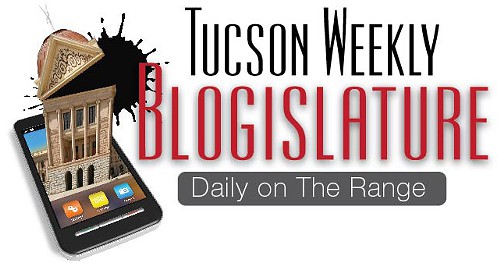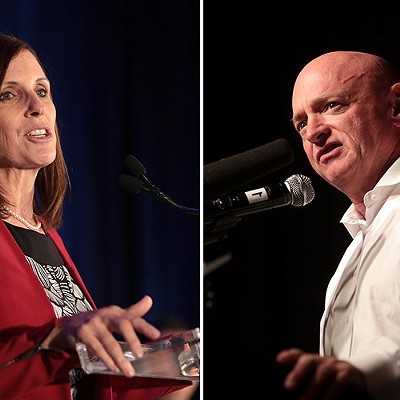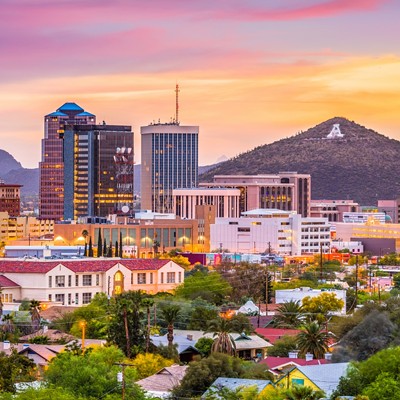Friday, March 25, 2011
Sierra Club: Save the State Parks!

Hello all! It appears that the Arizona Legislature has finished its work in committees and now will be addressing legislation primarily on the Floor. This means a few of the really awful bills may die for the session. Of course they can always suspend the rules to consider a measure — or amendment it on to another bill — and then there is the budget. As I indicated last week, the Senate budget is a disaster on many levels. We need to let the Governor and the House Leadership know that we care about Parks and ask them to remove the provisions in the budget that would significantly harm them.
The Senate budget sweeps funds that keep the Parks open and maintained. SB1612 general appropriations 2011-2012 (Biggs, Klein, Murphy, et al.) sweeps the Enhancement Fund of approximately $2,090 000. This is particularly outrageous as this fund consists of the user fees we all pay to use the parks. It also takes $1,491,100 from the State Lake Improvement Fund in this current fiscal year. If passed by the House and signed by the Governor, this will create a huge cash flow issue for parks and make it nearly impossible for the agency to pay its rent, meet payroll or pay for operations.SB1624 environment; 2011-2012; budget reconciliation (Biggs, Murphy, Pearce, et al) requires the State Parks Board to cut a bad deal for parks and the public. State Parks must issue requests for proposals for the private operation of some or all state parks, and requires the Board to allow a private entity to manage at least one park that was profitable in FY 2011 and at least one other park that was either not profitable or closed in FY 2011. The Board must award a contract by February 1, 2012.
Please call or email your representatives in the Arizona House and ask them to oppose both of these measures. Click on Save Our State Parks to send an email. To call from outside the Phoenix area, use the toll free number at 1-800-352-8404. In the Phoenix area call (602) 926-4221 (House). Ask them to connect you to your legislators’ offices. Remember calls can be very effective ways of reaching legislators.
Tell them to not to give away our state parks and destroy our state park system. Ask them to keep our parks public and funded via the dollars generated from fees and special funds. Parks protect cultural and natural areas and are important economic engines for rural Arizona.
Please also ask your representatives in the Arizona House to oppose the strike everything amendment on SB1517 (Melvin, Aboud: Antenori, et al). It deals with transmission lines; environmental compatibility certificates. All transmission lines that aregreater than 115 kilovolts must get a Certificate of Environmental Compatibility and go through the line siting process. This proposed striker is being proposed by the proponents of the proposed SunZia Southwest Transmission Project, which consists of two 500 kilovolt transmission lines that if built, will stretch across about 460 miles of Arizona and New Mexico. Several of the proposed locations in Arizona would affect important public lands and wildlife habitat, including the San Pedro River and the Aravaipa watershed.
The proponents have been trying to jam this bill through this session, so the project is not subject to review and approval, denial, or approval with conditions by the Arizona Power Plant and Transmission Line Siting Committee process. It will limit public input and access to information and potentially give Arizona less of a voice on these multi-state projects.
You can click on Keep Our Voice in Line Siting or call the House at (602) 926-4221 and ask for your representatives.
Don’t forget to comment in support of protecting more than one million acres of public lands around Grand Canyon from mining. The deadline is April 4. Click on Protect Grand Canyon from Mining to comment. You can also send an email to NAZproposedwithdrawal@azblm.org. For those of you, who would like to send in written comments, send them to:
Bureau of Land Management
Northern Arizona Proposed Withdrawal EIS
345 East Riverside Drive
St. George, UT 84790
Please support Alternative B, which includes the full one million acre withdrawal and the maximum protection.
Here are some bill updates:
HB2208 NOW: agriculture best management practices; rules (Reeve) awaits Committee of the Whole action in the Senate. The bill allows the Agricultural Best Management Practices Committee to adopt revisions to its rules as exempt rules with an immediate effective date in order to comply with the failure of Maricopa County to attain the air quality health-based standard for coarse particulates — PM-10. The Best Management Practices (BMPs) for agriculture have been a bit of a joke and certainly weak. The Environmental Protection Agency (EPA) has indicated they need to be enforceable on some level, so this bill requires that they actually implement one of them and that the rules require them to keep records and report. That is an improvement. There may be an amendment on the Floor to require mitigation measures on windier days for other activities. We may be able to support this bill with the amendment, but it is likely that more actions will be required to meet the health-based standards for particulates. MONITOR.
HB2114 had a strike everything amendment that was added in the Senate Water, Land Use, and Rural Development Committee that deals with the application of aquatic poison. It awaits action by Senate Rules. This is a bill that died earlier in the session, but is being resurrected by Senator Griffin in order to block efforts to recover native fishes in Arizona. While we encourage the careful and limited use of any chemical, including piscicides such as Rotenone and Antimycin A, this bill will erect an additional barrier and an unnecessary and redundant review that could further hinder recovery of native fishes, not to mention burden an agency — the Arizona Department of Environmental Quality — with a review process for which it has no funding. If this was a serious effort to protect our waters, it would address the many agricultural pesticides that actually do pollute our water and not just target chemicals that are used only for native fish recovery. OPPOSE.
HB2705 waste programs; general permits; fees (Reeve) awaits action by Rules in the Senate. It already passed out of the House. The bill eliminates specific fees and provides fee authority and general permit authority to the Arizona Department of Environmental Quality for solid waste programs. This relates to facilities such as waste tire collection sites and landfills. It also removes the specific percentages for activities in the Recycling Fund and allows the agency to establish fees related to hauling of biomedical hazardous waste, septage, etc. We support allowing the Arizona Department of Environmental Quality to increase fees for waste programs, so those fees can cover the costs of implementing the programs, reviewing and evaluating permits, and enforcement activities related to the permits. We do have some concerns overall, however.
Our major concern about the bill is the general permit authority for the Arizona Department of Environmental Quality relative to waste programs. This gives the director of the agency enormous discretion to establish these permits for a “defined class of facilities.” We cannot fathom what class of solid waste facilities would be appropriate for general permits. Once the general permit is established, there is no public notice or opportunity to comment or seek changes. Would the department be permitting landfills or used tire sites without public notice or comment? If there is a specific class of facilities that is appropriate for general permits, perhaps the legislature should identify it rather than giving the agency this broad open-ended authority. This type of discretion has been abused in other programs, such as with the Aquifer Protection Permit program where the agency is actually permitting uranium mines with general permits. OPPOSE.
SB1286 counties; cities; permits; time limit (Klein, Bundgaard, Harper, et al) passed out of the Senate 17-8-5, passed out of House Government, and awaits action by Rules. It says that within sixty days after receipt of a complete application for any permit issued by a city or town, the city or town shall approve or deny the proposed application. A failure to respond within sixty days after receiving a complete application for any permit constitutes approval of the application. This will result in more bad projects getting permitted. OPPOSE.
SB1322 NOW: managed competition; city services (Antenori) passed out of the Senate 18-10-2. It passed out of House Government Committee and awaits action by Rules. The bill requires larger cities to put most services out for bid to private entities. It is ridiculous and could result in more privatization of water and other essential services, even though it is not cost-effective and could risk the quality of our drinking water. OPPOSE.
SB1525 city; town; development fees (R. Pearce, Allen, Driggs, et al) passed out of the Senate 16-13-1, passed out of House Government Committee, and awaits action by House Rules. It further restricts cities’ ability to impose impact fees, thus promoting additional subsidies for development. This whole concept that development impact fees are hurting the economy and stopping development is ludicrous. Until the real estate, banking and financial interests brought the economy to its knees, they could not bulldoze fast enough and impact fees were in place. Why shouldn’t we have development pay for itself, especially when we continue to have empty houses throughout our state? It says they cannot assess impact fees for larger regional parks, among other things. OPPOSE.
SB1598 cities; counties; regulatory review (Klein, Allen, Burges, et al) passed out of the Senate 21-9, passed out of the House Government Committee, and awaits action by House Rules. It seeks to further tie the hands of cities and counties when it comes to licensing and permitting. These provisions were enacted for the state Department of Environmental Quality several years ago. It includes licensing time frames, which in effect means they churn out permits without the kind of review they should have, among other problems. OPPOSE.
SB1392 Mexican gray wolf; interstate compact (Allen, Griffin, Melvin, et al) passed out of the Senate 21-8-1, but was never heard in the House Judiciary Committee, so it should be dead for the session. It allows the governor to enter into an interstate compact on wolves. It seeks to remove wolves from the Endangered Species list and contains many weak and ambiguous provisions. It fails to incorporate the federal standards of the Endangered Species Act (ESA) requiring management decisions to promote the recovery of the species, while including language about it being unlawful to kill a wolf, it is only a misdemeanor and therefore inconsistent with laws relating to killing of an endangered species. Just 50 Mexican gray wolves remain in the wild today in eastern Arizona and western New Mexico. OPPOSE.
SB1393 greenhouse emissions; legislative authority (Allen: Gould, Griffin, et al) passed out of the Senate 21-8-1, but was not assigned to a committee in the House, so it should be dead for the session. Likewise, SB1394 greenhouse substances; freedom to breathe (Allen: Griffin, Reagan, et al) passed out of the Senate 21-8-1, but was not heard in the House Environment Committee, so it should also be dead for the session. There are plenty of ways to resurrect bills, however, so we will keep an eye out for this. SB1393 and SB1394 together constitute a “License to Pollute.” SB1393 says the state legislature is the only entity that can regulate human-caused carbon dioxide or other greenhouse gas emissions as well as particulates. SB1394 directs the governor to enter into a compact with states that have enacted “Freedom to Breathe” laws, such as SB1393. Both bills seek to undermine the efforts of the Environmental Protection Agency or any other entity to reduce greenhouse gas emissions and address climate disruption or to reduce particulate pollution. OPPOSE.
SB1395 endangered species act; interstate compact (Allen: Gould, Klein, et al) never came to the Floor of the Senate, so it is dead for the session. The bill allows the governor to enter into an interstate compact on endangered species, but is clearly intended to undercut and supplant the Endangered Species Act. It would make it illegal for a government official to enforce federal laws or regulations relating to endangered species in the state of Arizona. It also contains many weak and ambiguous provisions. The strength of the ESA has always been its commitment to science - this measure gives science a back seat to politics. OPPOSE.
SCR1015 jurisdiction over intrastate waters (Allen: Antenori, Biggs, et al) passed out of the Senate 21-8-1, but was not referred to a committee in the House, so should be dead for the session. It refers to the ballot a proposed constitutional amendment that says the State of Arizona has the “primary responsibility or exclusive right to prevent, reduce or eliminate pollution, to plan the development and use, including restoration, preservation and enhancement of this state's water resources.” Which is it? This is very confusing and ambiguous language to put into the Arizona Constitution. The intent is to remove Clean Water Act protections from the vast majority of Arizona waters. Without it, these waters will have no protections in place because the State of Arizona has no programs to protect them — all of our surface water protections are related to the Clean Water Act. OPPOSE.
SCR1024 intrastate water resources; state sovereignty (Griffin) passed out of the Senate 20-9-1 and the Energy and House Natural Resources Committee. It awaits action by House Rules. The bill is an anti-Clean Water Act resolution that says the legislature supports the continued sovereignty and jurisdiction of the states to regulate intrastate water resources and opposes any attempt by the federal government to diminish this jurisdiction unnecessarily — in this regard, they mean the Clean Water Act and they have no intention of putting protections in place. This is still silly, but at least, it is just a resolution. OPPOSE.
SCR1025 public funds: political candidates; ban (S. Pierce: Bundgaard) passed out of the Senate 20-9-1 and also passed out of the House Judiciary Committee. It awaits action by House Rules. It refers to the ballot a proposed constitutional amendment that prohibits public funds from being used to provide campaign support for candidates for public office. This is a backdoor repeal of Clean Elections. OPPOSE.
SCR1033 best available control technology; generation (Allen: Griffin, Klein, et al) passed out of the Senate 22-8. It awaits action in House Rules. This resolution urges the Department of Environmental Quality, in issuing Prevention of Significant Deterioration permits for new coal‑fueled power plants, to consider the use of commercially available technologies that are designed to be as efficient as is economically practicable, including advanced super‑critical pulverized coal, ultra super‑critical pulverized coal, etc. This would be contrary to the Clean Air Act and to anyone’s interpretation of Prevention of Significant Deterioration. OPPOSE.
SCM1007 state lands; mining; exploration (Melvin) awaits action in the House Rules Committee. It is only a “postcard” and does not affect the law, but it is a truly bad message to send. The memorial asks the Department of Interior not to withdraw from mining, one million acres of public lands near Grand Canyon. There are several inaccurate statements contained in the memorial, plus protecting these lands is a good idea that is broadly supported. OPPOSE.
Tags: Arizona Legislature , Arizona state parks , environment , Sierra Club


















